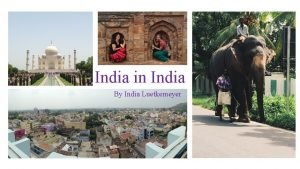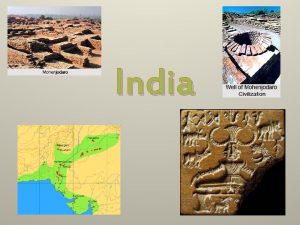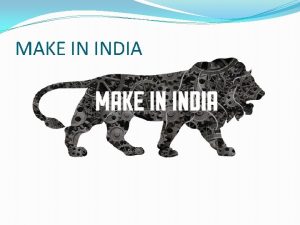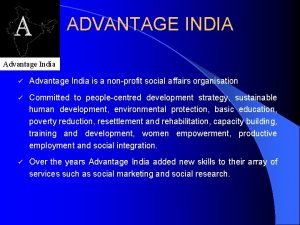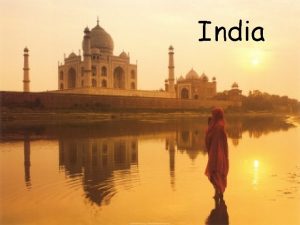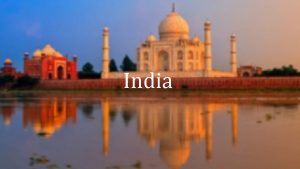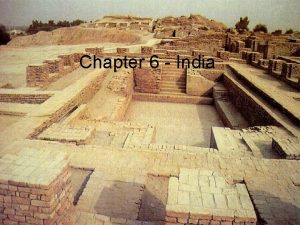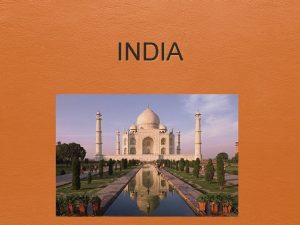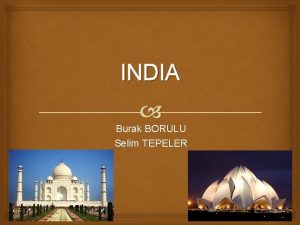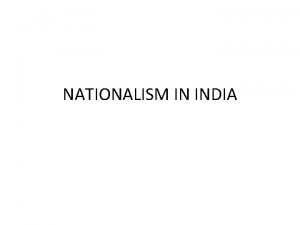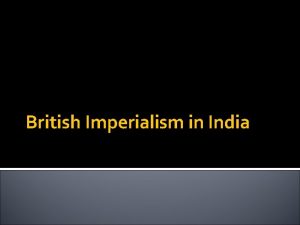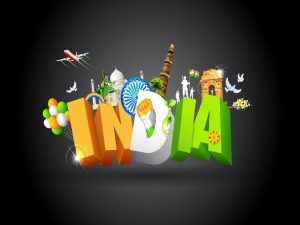India In the Midst of Change A Changing























- Slides: 23

India In the Midst of Change


A Changing Society: The Caste System • Traditional Hindu society divides its followers into 4 castes. • The castes put people in order from the bottom of society to the top. • BELOW the lowest caste are the Untouchables, a “casteless” or outcast Hindu group. Highest Class Priests Upper Class Nobles & Warriors Middle Class Merchants & Farmers Lower Class Servants & Peasants Untouchables – a “casteless” or an outcast Hindu group

A Changing Society: The Caste System • Over thousands of years, the caste system grew complex. The main castes divided into hundreds of groups, or subcastes. • The people in each subcaste had the same job. • The caste system gave Hindus a sense of order.


The English East India Company was founded in 1600 and soon established trading posts on India’s southern and eastern coasts. By the early 1800 s, the Company controlled most of India, which had been left void of a central power after the decline of the Mughal Empire.

British Colonization • Great Britain had controlled India for nearly two hundred years, but by the early 1900 s the British control of the region was starting to weaken. – Nationalism began to grow. – Indian National Congress was formed. – Mohandas Gandhi’s leadership was strong.

What is nationalism? • Nationalism is loyalty and devotion to a nation. • In the early 1900 s, nationalism grew in India. • Indians were upset by British rule, because they were treated as secondclass citizens in their own country.

The British monopoly on the salt trade in India dictated that the sale or production of salt by anyone but the British government was a criminal offense punishable by law. Salt was readily accessible to labourers in the coastal area, but they were instead forced to pay money for a mineral which they could easily collect themselves for free. The British ended up imprisioning over 60, 000 people, including Gandhi, for this illegal activity.

The Indian National Congress • The Indian National Congress (INC) was formed in 1885. • The goal of the organization was to gain rights and opportunities for the people of India. • By the mid-1930 s, the INC had won some self-rule for Indians. • The British told Indians to fight for allies in World War II. • Forced to participate in war for democracy while being denied independence, the INC refused to support Britain’s war effort.




Mohandas Gandhi • Gandhi led India’s struggle for independence from Great Britain. • He encouraged the practice of nonviolence, ahimsa. • Under Gandhi’s leadership, millions of Indians participated in nonviolent resistance against British rule. • Gandhi led fasts, protest marches, and boycotts of British goods.

Alas, Independence • Although Gandhi’s protests were peaceful, the British imprisoned him and INC officials on several occasions. • Riots began to erupt regularly. • This convinced the British that maintaining control of India was too costly. • Gandhi’s efforts were successful. • India won independence from Britain in 1947.








 Habakkuk prayer for revival
Habakkuk prayer for revival Hệ hô hấp
Hệ hô hấp Công của trọng lực
Công của trọng lực Số nguyên là gì
Số nguyên là gì Tỉ lệ cơ thể trẻ em
Tỉ lệ cơ thể trẻ em đặc điểm cơ thể của người tối cổ
đặc điểm cơ thể của người tối cổ Các châu lục và đại dương trên thế giới
Các châu lục và đại dương trên thế giới ưu thế lai là gì
ưu thế lai là gì Thẻ vin
Thẻ vin Môn thể thao bắt đầu bằng chữ f
Môn thể thao bắt đầu bằng chữ f Tư thế ngồi viết
Tư thế ngồi viết Cái miệng nó xinh thế chỉ nói điều hay thôi
Cái miệng nó xinh thế chỉ nói điều hay thôi Hát kết hợp bộ gõ cơ thể
Hát kết hợp bộ gõ cơ thể Từ ngữ thể hiện lòng nhân hậu
Từ ngữ thể hiện lòng nhân hậu Trời xanh đây là của chúng ta thể thơ
Trời xanh đây là của chúng ta thể thơ Tư thế ngồi viết
Tư thế ngồi viết Thế nào là giọng cùng tên?
Thế nào là giọng cùng tên? Voi kéo gỗ như thế nào
Voi kéo gỗ như thế nào Thể thơ truyền thống
Thể thơ truyền thống Sự nuôi và dạy con của hổ
Sự nuôi và dạy con của hổ Diễn thế sinh thái là
Diễn thế sinh thái là đại từ thay thế
đại từ thay thế Thế nào là hệ số cao nhất
Thế nào là hệ số cao nhất Vẽ hình chiếu vuông góc của vật thể sau
Vẽ hình chiếu vuông góc của vật thể sau
























